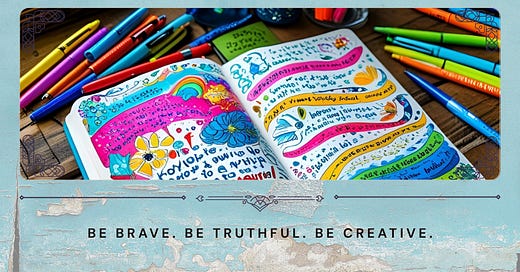IN A DARK TIME, there's something profound about losing yourself in a story, a song, or a piece of art. In those moments art is not a luxury, but as necessity—a fundamental human reflex to escape the pain for a bit and enter into something bigger and brighter than yourself and the worries you carry. The cliche is true; look to the light.
Art serves us by inviting us into hope, or even joy. Think of a book or poem, a painting or a textile creation (I’m thinking of an intricate quilt in the brightest colors that was mounted on the wall of the sanctuary at my little church last Sunday); whatever the form, these creative acts transform a dark moment into a lighter one.
We need more of that right now. And if you’re a writer or an artist (or want to be one), you have this ability within you. It’s been given to you; don’t hoard it. But I’m jumping ahead.
It’s been given to you; don’t hoard it.
It is in darkness that art reveals its true power. When everything falls apart, we don't reach for spreadsheets or instruction manuals or dry academic works. We reach for stories. I think about Michael Hingson and his guide dog Roselle, successfully navigating 78 floors down from the World Trade Center on September 11th—and running together away from the collapse—their story in Thunder Dog is more than just a dog story or survival narrative. It’s a testament of trust and faith that continues to inspire readers decades later, because hope is universal.
Or there’s the unbreakable boy, Austin LeRette, an eighteen-year-old with autism and brittle bone disease who treats a broken back as "a minor inconvenience" and considers enjoying a strawberry milkshake the ultimate in joy. He reminds us that joy isn't the absence of suffering—it's the radical choice to celebrate life anyway. His story carries Austin's infectious optimism to hearts that need to remember how to find wonder in small moments.
A quiet but powerful story is Patrick Barrett's journey in Sanctuary, where rescue donkeys in an ancient Irish village became unlikely healers for a man broken by PTSD and addiction. His story reveals how connection—whether to animals, community, or purpose—save lives.
Art kindles hope. Stories shed light. This is why authoritarian regimes target artists and truth-tellers. They understand what we sometimes forget: stories shape reality. A single song can topple governments. A painting can shift entire worldviews. A poem can kindle revolution in hearts that seemed permanently resigned.
For you and I, for us as storytellers, we can (if we decide to) carry a sacred responsibility. In an age of algorithms and AI, of deepfakes and manufactured outrage, raw and brave human creativity becomes both anchor and compass. Your story—messy, honest, contradictory, deeply felt—can cut through noise and through deception and manipulation like nothing else can.
Truth-tellers are sometimes targets, but they are also prophets, and they keep writing and they keep talking. Truth-telling is a subversive act, in the best way possible.
This is especially true when we dare to tell the stories that have been co-opted or flattened or even outright ignored by cultural agendas. My upcoming book Jesus Was: Not What We Expected but Better Than We Imagined, explores how even the most sacred narratives can be distorted when filtered through our biases and expectations. In a world where stories are sometimes reshaped to advance agendas, authentic storytelling frees us up from the smoke and mirrors that have accumulated around and over true stories, like those told about and by Jesus.
We need artists and writers who remember that rebellions are indeed built on hope, and hope is built on the radical act of imagining that things can be different. Every time someone puts pen to paper, brush to canvas, or voice to song with genuine intention, they perform a small act of resistance against despair.
A story is more than just a personal victory. A story can become a light for others walking a dark or frightening path.
The world needs you and your stories right now. Not perfect ones, but true ones. Because somewhere, in someone's darkest hour, your art can be exactly the light they need to keep going. Creativity kindles hope.





I don't know why but I teared up at every mention of one of your books. They are important books, Susy. I am painting a lot right now. Gee, I wonder why!?
We absolutely need more light to counter the darkness. As the song goes - This little light of mine, I'm gonna let it shine.